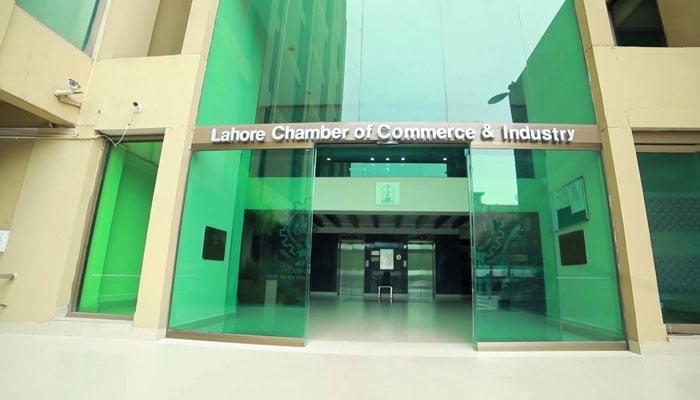LCCI warns of revenue shortfall, urges policy reforms to avoid mini-budget
LAHORE: The Lahore Chamber of Commerce and Industry (LCCI) has raised alarms over a potential revenue shortfall exceeding Rs1 trillion by the end of FY25, warning that such a deficit could force the government to introduce a mini-budget, further straining businesses and people.
LCCI President Mian Abuzar Shad, Senior Vice President Engineer Khalid Usman, and Vice President Shahid Nazir Chaudhry highlighted the Federal Board of Revenue’s (FBR) failure to meet collection targets. Shad noted that the FBR had fallen short by over Rs190 billion during the first four months of the fiscal year and missed October’s target by more than Rs100 billion.
“If this trajectory continues unchecked, the consequences will be dire,” Shad cautioned. “A revenue deficit of Rs1 trillion is not just a number; it represents a significant threat to fiscal stability.” Shad criticised the government’s focus on political matters, which he said has sidelined much-needed economic reforms, deepening the ongoing revenue crisis. “If corrective measures are not implemented promptly, Pakistan will face a financial crunch that could derail its economic recovery,” he warned.
The LCCI urged policymakers to prioritise addressing structural issues within the tax system rather than relying on short-term revenue-generating measures that place undue pressure on existing taxpayers. “The solution lies in broadening the tax base, not squeezing those already contributing,” Shad asserted.
Highlighting untapped potential in the country’s financial system, Shad pointed to over 100 million bank accounts as a vast resource that could significantly boost revenue if brought into the formal economy. He called for innovative, technology-driven approaches to integrate these accounts effectively.
The LCCI leadership also criticised recent stopgap measures, such as increased federal excise duties on sugary drinks and higher withholding taxes on imports and services. They labelled these steps as superficial fixes that fail to address underlying fiscal issues. “These temporary measures may plug gaps in the short term but are unsustainable, adding to the burden on consumers and businesses,” they noted.
Shad further warned against heavy taxation on imports and raw materials, arguing that it stifles industrial growth and undermines the competitiveness of local industries. “Excessive duties discourage investment, limit production, and ultimately hurt exports. This creates a vicious cycle that exacerbates the revenue shortfall instead of alleviating it,” he explained. The LCCI stressed the need for structural reforms and urged the government to engage with the business community to develop policies that promote growth and stability.
“We need a comprehensive, long-term strategy that fosters economic expansion,” Shad said. “The government must bring stakeholders to the table to devise pragmatic solutions for ensuring fiscal discipline and economic progress.”
-
 Michelle Obama Gets Candid About Spontaneous Decision At Piercings Tattoo
Michelle Obama Gets Candid About Spontaneous Decision At Piercings Tattoo -
 Bunnie Xo Shares Raw Confession After Year-long IVF Struggle
Bunnie Xo Shares Raw Confession After Year-long IVF Struggle -
 Brooks Nader Reveals Why She Quit Fillers After Years
Brooks Nader Reveals Why She Quit Fillers After Years -
 Travis Kelce Plays Key Role In Taylor Swift's 'Opalite' Remix
Travis Kelce Plays Key Role In Taylor Swift's 'Opalite' Remix -
 How Jennifer Aniston's 57th Birthday Went With Boyfriend Jim Curtis
How Jennifer Aniston's 57th Birthday Went With Boyfriend Jim Curtis -
 JoJo Siwa Shares Inspiring Words With Young Changemakers
JoJo Siwa Shares Inspiring Words With Young Changemakers -
 James Van Der Beek Loved Ones Breaks Silence After Fundraiser Hits $2.2M
James Van Der Beek Loved Ones Breaks Silence After Fundraiser Hits $2.2M -
 Disney’s $336m 'Snow White' Remake Ends With $170m Box Office Loss: Report
Disney’s $336m 'Snow White' Remake Ends With $170m Box Office Loss: Report -
 Travis Kelce's Mom Donna Kelce Breaks Silence On His Retirement Plans
Travis Kelce's Mom Donna Kelce Breaks Silence On His Retirement Plans -
 Premiere Date Of 'Spider-Noir' Featuring Nicolas Cage Announced
Premiere Date Of 'Spider-Noir' Featuring Nicolas Cage Announced -
 Pedro Pascal's Sister Reveals His Reaction To Her 'The Beauty' Role
Pedro Pascal's Sister Reveals His Reaction To Her 'The Beauty' Role -
 Kate Middleton Proves She's True 'children's Princess' With THIS Move
Kate Middleton Proves She's True 'children's Princess' With THIS Move -
 Paul Anka Reveals How He Raised Son Ethan Differently From His Daughters
Paul Anka Reveals How He Raised Son Ethan Differently From His Daughters -
 'A Very Special Visitor' Meets Queen Camilla At Clarence House
'A Very Special Visitor' Meets Queen Camilla At Clarence House -
 Jodie Turner Smith Shares One Strict Rule She Follows As A Mom
Jodie Turner Smith Shares One Strict Rule She Follows As A Mom -
 Hailey Bieber Reveals KEY To Balancing Motherhood With Career
Hailey Bieber Reveals KEY To Balancing Motherhood With Career




